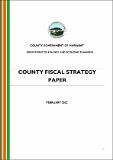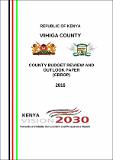| dc.description.abstract | This study sets out to investigate the determinants offi scal balance in
Kenya. A model developed from three-gap analysis is used, together
with time series data for the period 1975 to 2006. The long run results
indicate that treasury bill rate positively and significantly affects fiscal
balance, while total debt service and trade openness negatively and
significantly affect fiscal balance. However, real per capita GDP is
not a significant determinant of fiscal balance. Using error correction
model, the results indicate that real per capita GDP positively and
significantly affects fiscal balance, while total debt service and trade
openness have a negative and significant impact. Finally, the 1993
liberalization policies negatively impacted onfiscal balance. The study
recommends the need to develop policies that will spur economic growth
and increase employment to increase revenue and curb fiscal deficit.
Further, the government needs to use concessional sources of funds,
such as gmnts instead of commercial borrowing, to reduce the build up
of debt and.fiscal deficit. The government should also be cautious with
policies geared towards trade openness as they expose the economy to
adverse external shocks, thereby worsening fiscal balance. | en |



